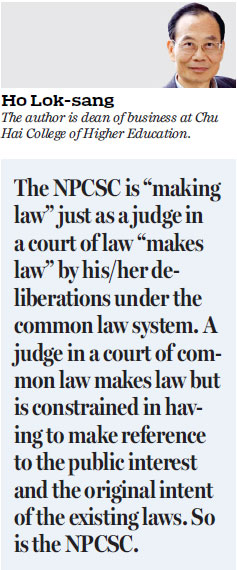Worry over NPCSC decisions not warranted
Updated: 2018-01-03 07:12
(HK Edition)
|
|||||||
Latest resolution on co-location has ruffled feathers in the legal community but Ho Lok-sang points out previous NPCSC interpretations always had city's interests in mind
Following the statement of the Hong Kong Bar Association on the decision of the National People's Congress Standing Committee of Dec 27, 2017 on the cooperation agreement between the Chinese mainland and Hong Kong Special Administrative Region on the establishment of the port at the West Kowloon Station of the Guangzhou-Shenzhen-Hong Kong Express Rail link for implementing the co-location arrangement, quite a few Hong Kong commentators expressed similar worries that the decision constitutes an erosion of the rule of law and "severely undermines public confidence in 'one country, two systems'". I am no legal expert, but based on my reading of the case and my knowledge about the rule of law in theory and in practice as a public policy analyst, I do believe that while many Hong Kong people's worries, including that of the Bar Association, are genuine, but they are unfounded.

The Hong Kong Bar Association is concerned and "appalled" by the assertion by the NPCSC that the cooperation agreement is consistent with the Constitution of the People's Republic of China and the Basic Law of the HKSAR without stating how this is so. This strong criticism of the NPCSC endorsement was fuel for some commentators, one of whom was effectively saying that the rule of law has degenerated to just anything the NPCSC calls the rule of law. Although this turn of events is perhaps expected, given the current atmosphere, it is still most unfortunate and unwarranted. Actually anyone who worries about the NPCSC trampling on Hong Kong people's interests can check out its track record of all past interpretations of the Basic Law.
Since the handover, a total of five interpretations of the Basic Law had been made by the NPCSC. Among these, two are uncontroversial. One relates to the term of office of the chief executive when the current one resigned before the end of the term. Because neither the Basic Law (Article 53) nor the Chief Executive Election Ordinance specified what should happen next, the acting chief executive, Donald Tsang Yam-kuen, who stepped into his spot, requested an interpretation of the Basic Law and proposed that the succeeding chief executive should fulfill the remainder of Tung Chee-hwa's term. The other non-controversial issue had to do with diplomatic immunity, which is clearly outside Hong Kong SAR's jurisdiction.
Of the remaining three, the first one - relating to the Right of Abode issue in 1999 - was intended to avoid a potential influx of over a million mainland residents (according to government estimates) into Hong Kong. The interpretation was made on request by the SAR government, and was clearly intended to benefit Hong Kong. The other two interpretations related to election of the chief executive (2004) and the oath-taking of legislators (2016). Regarding the latter, the presiding judge actually said that even without the NPCSC interpretation, the ruling would have been the same. The "interpretation" was just stating the obvious. In order for an oath to have legal effect, it has to be solemnly made. An "oath-taking" that is not taken seriously would be void. The disqualification of legislators followed according to the local law: the Oaths and Declarations Ordinance, which requires the disqualification without exception - as long as the antecedent condition, namely "declin(ing) or neglect(ing) to take an oath duly requested which he is required to take" is fulfilled. The only interpretation by the NPCSC that people might object to has to do with election of the CE. But we need to know that the CE is accountable to both Beijing and to Hong Kong people. The interpretation did add two new rules to the process, so that the CE must first report to the NPCSC about any amendment to the method of election, and that the NPCSC can decide whether it is necessary. These changes in the eyes of some "curbed Hong Kong's autonomy when it comes to reforming its own democratic process" but in all fairness only reflected Beijing's attempt to ensure that the elected CE will not ignore the nation's overall interest even as he or she pursues Hong Kong's interest.
It is true that the NPCSC does add content to the Basic Law as it interprets it or as it deliberates on certain specific issues. Just as in the case of the NPCSC interpretation of the Basic Law relating to the term of office of a CE who assumes duty as the original CE resigns ahead of completion of his term, there are situations that may arise which cannot be anticipated by those who drafted the Basic Law or passed it into law. It is important to note that interpretations or deliberations in these cases are not arbitrarily made, and are actually always duly considered, and reached after a due process, making reference to the interests of Hong Kong and those of the nation as appropriate. The NPCSC is "making law" just as a judge in a court of law "makes law" by his/her deliberations under the common law system. A judge in a court of common law makes law but is constrained in having to make reference to the public interest and the original intent of the existing laws. So is the NPCSC.
(HK Edition 01/03/2018 page8)